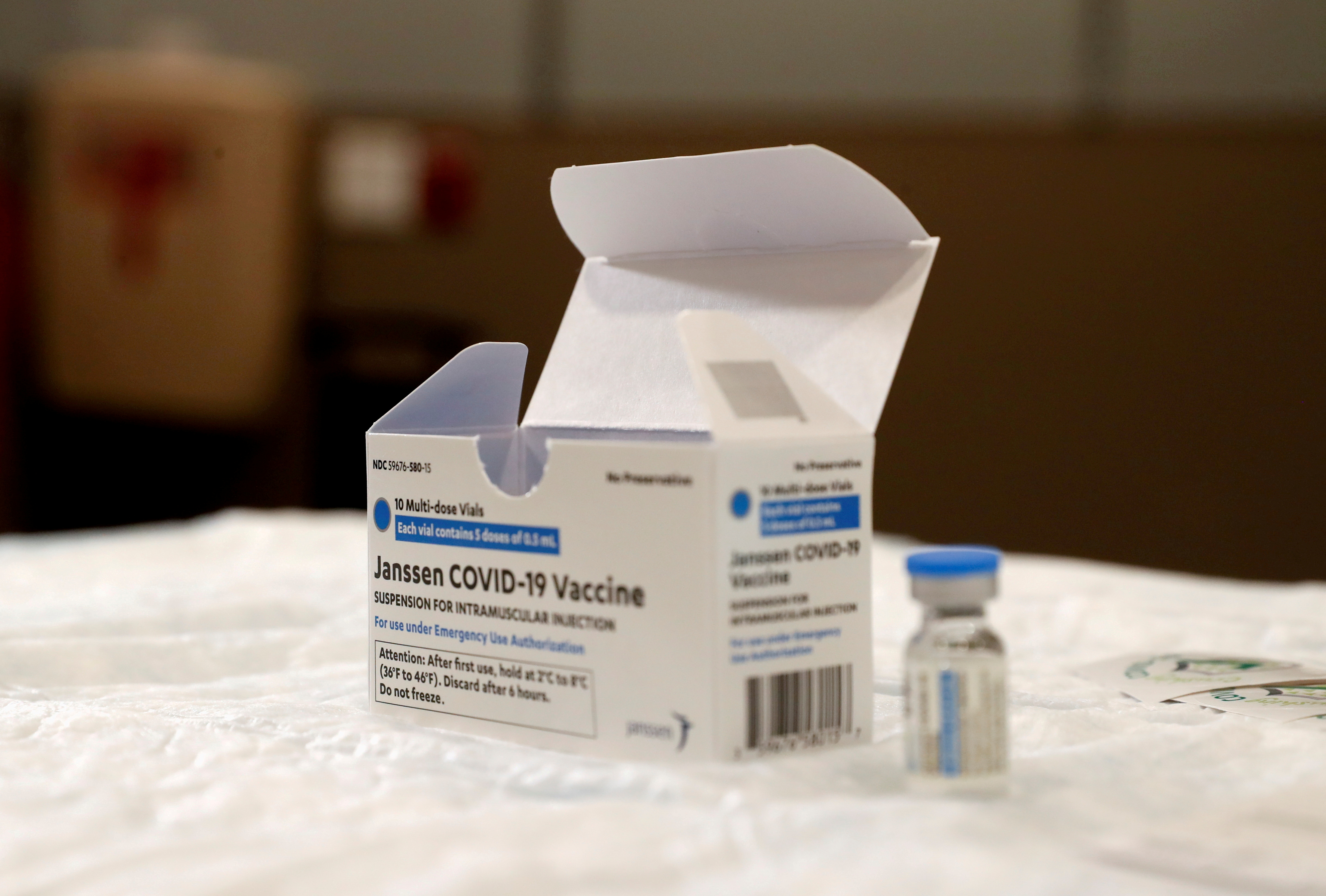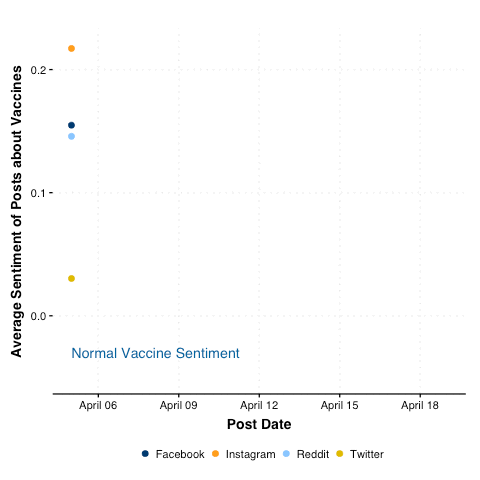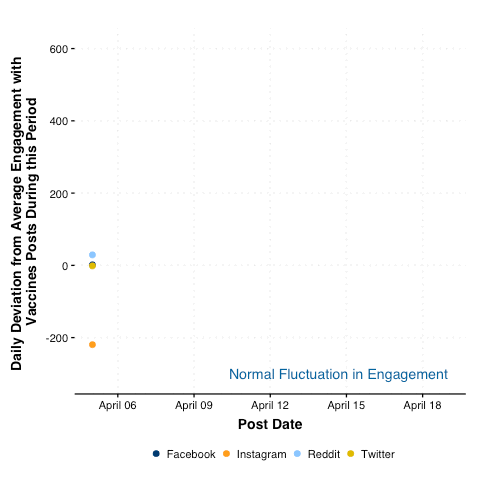
Throughout the pandemic, social media’s role in shaping public-health discourse has been a source of frequent debate. But given data limitations and methodological challenges, assessing its impact has been difficult.
The U.S. Centers for Disease Control and Prevention (CDC) and the Federal Drug Administration’s (FDA) recent decision to suspend Johnson & Johnson’s Janssen COVID-19 vaccine provided a rare opportunity to observe how important new information travels through social media platforms and changes the tenor of online conversations. According to conventional wisdom, as news of the suspension spread across social media it should have driven greater engagement around vaccine-related content and spurred more negative discussion of vaccines.
A preliminary assessment of more than two million vaccine-related posts across Facebook, Instagram, Reddit, and Twitter reveals little evidence in support of this claim. Although the announcement registered on social media platforms, its effect on both the tenor of vaccine discourse and interest in vaccine-related posts was either short-lived or largely inconsequential. While the pause in J&J vaccinations appears to have negatively impacted public opinion regarding the vaccine, that shift likely occurred through more traditional media pathways or private channels.
The J&J pause
On April 13, 2021, the CDC and the FDA announced that they would pause the distribution of Johnson & Johnson’s COVID-19 vaccine. The decision to halt vaccine rollout was made “out of an abundance of caution” following reports that six women between the ages of 18 and 48 developed blood clots after receiving the shot, with one reported death. Some in the scientific community were quick to point out that this risk was still less than one in one million at the time. Others lauded the decision as evidence that “close attention is being paid to, and extremely high priority put on, vaccine safety.” Vaccine skeptics, unsurprisingly, seized on the announcement to cast doubt on the mass vaccination effort in its entirety.
By April 23, the FDA and CDC reversed course, but polling data found that the momentary hiatus may have done significant damage to public confidence in the J&J vaccine. According to one ABC-Washington Post poll, fewer than a quarter of unvaccinated Americans said they would be willing to get the J&J vaccine following the pause, raising concerns about whether the U.S. vaccine roll-out might falter.
Investigating the role of social media
To evaluate the role of social media in shaping public perceptions of vaccines against the backdrop of the J&J pause I examined two metrics: (1) changes in the sentiment of posts related to vaccines; and (2) engagement with vaccine-related content. I relied on data pulled from social media platforms through the CrowdTangle API and Twitter API between April 5 and April 19, 2021. I restricted my search to public posts on Facebook, Instagram, Reddit, and Twitter that included one of the following terms: “Johnson and Johnson”, “Johnson & Johnson”, “J&J”, “Moderna”, “Pfizer”, “AstraZeneca”, or “vaccine.”
To calculate the sentiment of each post, I use a sentiment analysis tool designed to pick up nuances in social media text (e.g., word capitalization or excessive punctuation). This tool scores posts from 1 (extremely positive) to -1 (extremely negative) and is commonly used in the analysis of text data. I found that while conversations about vaccines on the internet grew more negative in the immediate aftermath of the pause, this dip turned out to be temporary across all platforms. Just a few days after the CDC and FDA halted the distribution of the J&J vaccine, the average sentiment of posts largely returned to normal. These trends are plotted in Figure 1.

To measure fluctuations in engagement with vaccine-related content across platforms, I first established a baseline by calculating the average engagement with such content on each platform over the fifteen-day period. Then, I subtracted this from the daily average engagement with vaccine-related content on the same platform. Positive values mean that vaccine-related posts saw more engagement on a given day than the platform average. Negative values mean that such posts saw less engagement.
I found that the announcement did little to increase the average engagement with posts about vaccines (Figure 2), which remained largely unchanged before and after the announcement. On Facebook and Twitter in particular, the vaccine announcement did not change engagement with vaccine-related content at all. On Reddit, I observed a short-lived spike in engagement with such content. On Instagram, engagement with vaccine-related posts deviates dramatically throughout the entire period (including before the announcement) and is likely driven by a few high performing posts from users with large followings.

To be sure, there are limitations to this analysis. It is unclear, for example, whether some potentially more contentious posts were removed by these platforms prior to collecting the data. I am also only working with public data, which by definition, excludes posts made by private users. And I do not systematically assess the accuracy or quality of posts that were shared, so these findings do not bear on the effect of vaccine misinformation across platforms. Furthermore, opinions expressed on social media do not necessarily represent the perceptions of the population as a whole, despite the fact that these platforms are used by 72 percent of U.S. adults and 53.6 percent of the population globally.
Overall, however, these results suggest that if the pause had an effect on public opinion, it is unlikely that the pathway was through increased public attention on social media. While the FDA and CDC’s decision does not seem to have shifted the aggregate sentiment of public social media posts, popular opinion toward the vaccines changed, with fewer unvaccinated people willing to get the J&J shot following the pause. This suggests that either that shift will also be temporary or that there is another pathway in play, such as private signaling or persuasion in encrypted channels or traditional media, among others.
As the policy community and public health officials work to restore trust in the J&J vaccine, it will be critical to develop a multipronged approach toward encouraging vaccine uptake. Disproportionate attention paid to the role of public social media communications in fomenting vaccine skepticism may detract from other channels where this pathway is more common or more sensitive to sudden policy changes.
Valerie Wirtschafter is a senior data analyst in the Artificial Intelligence and Emerging Technologies Initiative at the Brookings Institution and a Ph.D. candidate in the Department of Political Science at the University of California, Los Angeles.
Facebook provides financial support to the Brookings Institution, a nonprofit organization devoted to rigorous, independent, in-depth public policy research.
"social" - Google News
April 30, 2021 at 03:00AM
https://ift.tt/2QGiXMB
Tracking the impact of the J&J pause across social media - Brookings Institution
"social" - Google News
https://ift.tt/38fmaXp
https://ift.tt/2WhuDnP
Bagikan Berita Ini














0 Response to "Tracking the impact of the J&J pause across social media - Brookings Institution"
Post a Comment